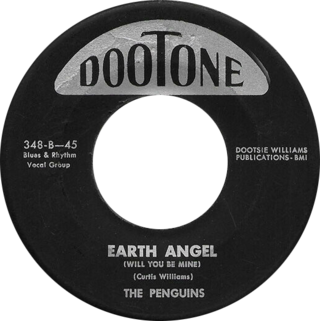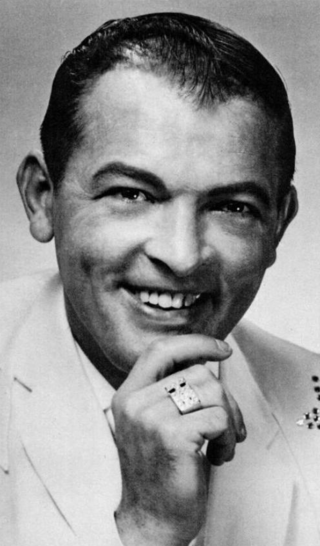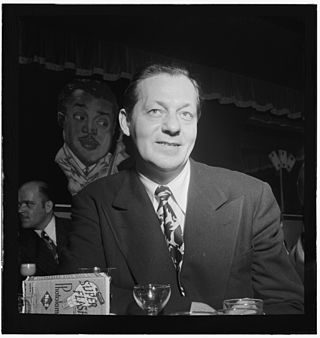Related Research Articles

Doo-wop is a genre of rhythm and blues music that originated in African-American communities during the 1940s, mainly in the large cities of the United States, including New York, Philadelphia, Pittsburgh, Chicago, Baltimore, Newark, Detroit, Washington, D.C., and Los Angeles. It features vocal group harmony that carries an engaging melodic line to a simple beat with little or no instrumentation. Lyrics are simple, usually about love, sung by a lead vocal over background vocals, and often featuring, in the bridge, a melodramatically heartfelt recitative addressed to the beloved. Harmonic singing of nonsense syllables is a common characteristic of these songs. Gaining popularity in the 1950s, doo-wop was "artistically and commercially viable" until the early 1960s, but continued to influence performers in other genres.

William Edward "Little Willie" John was an American R&B singer who performed in the 1950s and early 1960s. He is best known for his successes on the record charts, with songs such as "All Around the World" (1955), "Need Your Love So Bad" (1956), "Talk to Me, Talk to Me" (1958), "Leave My Kitten Alone" (1960), "Sleep" (1960), and his number-one R&B hit "Fever" (1956). An important figure in R&B music of the 1950s, he faded into obscurity in the 1960s and died while serving a prison sentence for manslaughter.

Brunswick Records is an American record label founded in 1916.

Exposé is an American freestyle vocal group formed in 1984 in Miami, Florida. Primarily consisting of lead vocalists Jeanette Jurado, Ann Curless, and Gioia Bruno, the group achieved much of their success between 1984 and 1993. They became the first group to attain four top-10 entries on the Billboard Hot 100 since their debut album, including 1988 number-one single "Seasons Change." In March 2015, Billboard magazine named the group the eighth most-successful girl group of all-time.

Donald Toussaint L'Ouverture Byrd II was an American jazz and rhythm & blues trumpeter and vocalist. A sideman for many other jazz musicians of his generation, Byrd was one of the few hard bop musicians who successfully explored funk and soul while remaining a jazz artist. As a bandleader, Byrd was an influence on the early career of Herbie Hancock and many others.
The music of Michigan is composed of many different genres. The city of Detroit has been one of the most musically influential and innovative cities for the past 50 years, whether in Michigan or anywhere else in the United States. Impressively, for 48 straight years (1959–2007) a greater Michigan-area artist has produced a chart-topping recording. Michigan is perhaps best known for three developments: early punk rock, Motown, and techno.

"Earth Angel", occasionally referred to as "Earth Angel (Will You Be Mine)", is a song by American doo-wop group the Penguins. Produced by Dootsie Williams, it was released as their debut single in October 1954 on Dootone Records. The Penguins had formed the year prior and recorded the song as a demo in a garage in South Central Los Angeles. The song's origins lie in multiple different sources, among them songs by Jesse Belvin, Patti Page, and the Hollywood Flames. Its authorship was the subject of a bitter legal dispute with Williams in the years following its release.
Was (Not Was) is an American pop rock group founded in 1979 in Detroit, Michigan, by David Weiss and Don Fagenson, who adopted the stage names David Was and Don Was. Their song catalog features an eclectic mix of pop and rock styles, often featuring guest musicians from across the musical spectrum. The band's most popular period was during the 1980s and early 1990s, with their highest-charting hit, the song "Walk the Dinosaur", released in 1987 as the lead single from their 1988 album What Up, Dog?, becoming a worldwide top-40 hit and peaking at No. 7 on the Billboard Hot 100 singles chart. The band went on indefinite hiatus in the mid-1990s, but has returned sporadically since the turn of the millennium. Their most recent release was the 2008 album Boo!.
Jack Scott was a Canadian-American singer and songwriter. He was inducted into the Canadian Songwriters Hall of Fame in 2011 and was called "undeniably the greatest Canadian rock and roll singer of all time."

Robert Lee Helms was an American country singer, who is best remembered for his 1957 Christmas hit "Jingle Bell Rock". Additionally, he had two other hit records from that year: "Fraulein" and "My Special Angel".

WLNO – branded WLNO 1060 AM – is a commercial urban gospel radio station licensed to serve New Orleans, Louisiana. Owned by Eternity Media Group LLC, the station serves the New Orleans metropolitan area. The WLNO transmitter site in located in Belle Chasse.
Francis Craig was an American songwriter, honky tonk piano player, and leader of a Nashville dance band. His works included "Dynamite" and "Near You", the latter being the first Billboard #1 hit out of Nashville.

"Hanky Panky" is a song written by Jeff Barry and Ellie Greenwich for their group, the Raindrops.
The Flying Machine were a British bubblegum pop band who are best known for their 1969 American No. 5 hit, "Smile a Little Smile for Me".

"At the Hop" is a 1950s pop song written by Artie Singer, John Medora, and David White and originally released by Danny & the Juniors. The song was released in the fall of 1957 and reached number one on the US charts on January 6, 1958, becoming one of the top-selling singles of 1958. "At the Hop" also hit number one on the R&B Best Sellers list. Somewhat more surprisingly, the record reached #3 on the Music Vendor country charts. It was also a big hit elsewhere, which included a number 3 placing on the UK charts.

Bob Chester was an American jazz and pop music bandleader and tenor saxophonist.

Robin Henry Seymour was an American radio personality and disc jockey who worked at CKLW and WKMH. He was also the host of the television series Teen Town and Swingin' Time in Detroit. He started in radio as a child actor on the Lone Ranger Show and eventually became one of the country's longest-serving disc jockeys.

Harvey Fuqua was an American rhythm and blues singer, songwriter, record producer, and record label executive.
"Long Lonely Nights" is a song that was originally released by Lee Andrews & the Hearts in 1957. Hit versions were also released by Clyde McPhatter, later in 1957, and Bobby Vinton in 1965. The song was written by Lee Andrews, though Larry Brown, Doug Henderson, and Mimi Uniman were given songwriter credit as well, in a practice that was common at the time.
"Mr. Lee" is a 1957 single by The Bobbettes. The song peaked at #1 on the CHUM Chart in Canada and on national R&B charts in the United States in 1957. It was included in Robert Christgau's "Basic Record Library" of 1950s and 1960s recordings, published in Christgau's Record Guide: Rock Albums of the Seventies (1981).
References
- 1 2 3 "Armenian Jazz Group Is Latest In Detroit". Arizona Republic. Phoenix, Arizona. June 16, 1957. p. 45 – via newspapers.com.
- ↑ "Reviews of New Pop Records". Billboard. April 20, 1957. p. 55.
- 1 2 Whitburn, Joel (2000). Top Pop Singles 1955-1999. Menomonee Falls, Wisconsin: Record Research, Inc. p. 21. ISBN 0-89820-139-X.
- ↑ "Territorial Best Sellers". Billboard. May 13, 1957. p. 60.
- ↑ "Territorial Best Sellers". Billboard. May 6, 1957. p. 48.
- ↑ "After Dark". Detroit Free Press. Detroit, Michigan. April 9, 1957. p. 18.
- ↑ "After Dark". Detroit Free Press. Detroit, Michigan. May 14, 1957. p. 16.